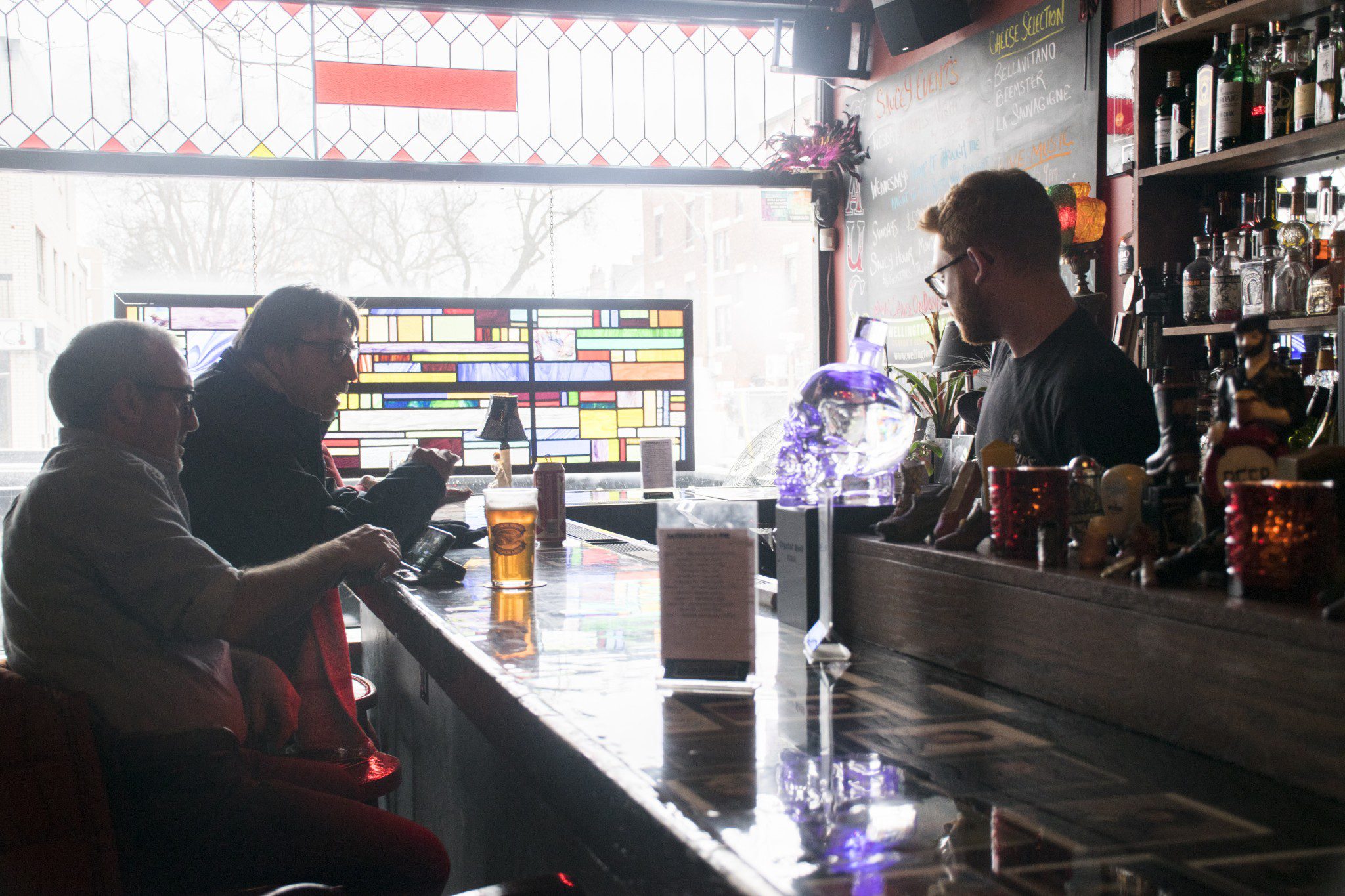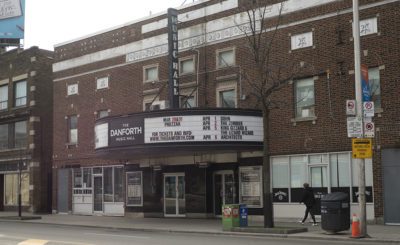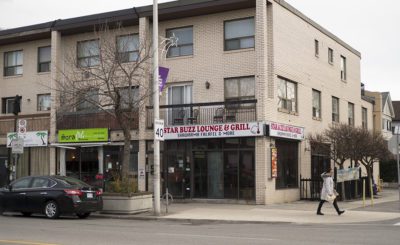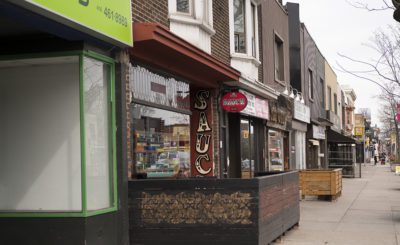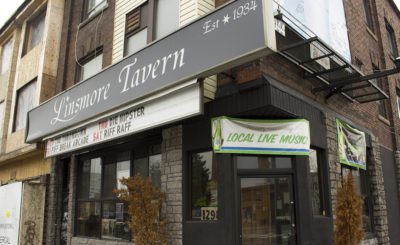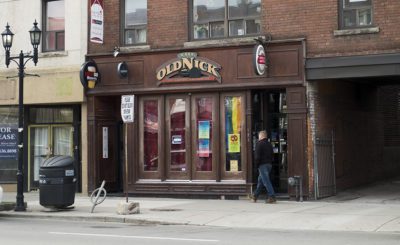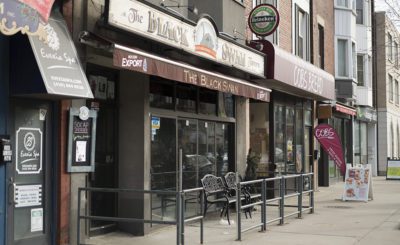Patrons bob their heads to the music as Julian Fauth’s hands dance across the keyboard. Fauth is a Juno award-winning jazz performer and every Tuesday night he bring his talent to Sauce.
Located on the Danforth, the cultural and business hub of East York, Sauce is just one of a handful of bars and restaurants that still provide a venue for live music in the area. Toronto has started to gain a reputation for its disappearing music scene. Many of the city’s largest music venues and night clubs have shut down in recent months. Clubs such as the Hoxton, Silver Dollar Room and Soybomb have all closed their doors.
Local bar and restaurant owners along the Danforth say one issue faced by all live music venues is noise complaints.
Mitzy Belisle is the owner of Sauce, a bar on 1376 Danforth Ave. which frequently hosts live music. She’s also the co-chair of the Danforth Mosaic Business Improvement Association (BIA).
She says live music is important because it benefits both her business and East York.
“It brings in new customers and fills the room every Saturday afternoon,” Belisle said.
Residents who are not fond of live music often phone 311 to file noise complaints, which leads to a by-law officer inspecting the facility. Belisle says most of the complaints come from adjacent tenants who live above the bar or very close to it.
“I don’t know why anyone would complain. It’s music and it’s supposed to make you feel good,” Belisle said.
Another issue for owners is that a bulk of noise complaints are wrongly attributed to their businesses.
Because of her backyard patio, Belisle often deals with authorities showing up to determine if excessive noise is coming from Sauce. She says that bylaw enforcers usually determine that the noise is coming from other neighbours and not the bar.
A 2015 report by ML&S found that complaints for loud music have increased by 170 per cent since 2009. In Ward 30, below the Danforth, the report says there has been an 850 per cent increase. Along the Danforth, the Toronto Observer has discovered that there have been at least 142 noise complaints against bars and other clubs and restaurants where music is played, in the last three years.
City Hall’s Music Strategy
it is a reputation that the city is trying to reverse.
After being elected as mayor, John Tory promised to salvage Toronto’s music scene and in April 2016, city council voted unanimously to endorse the Toronto Music Advisory Council’s official Music Strategy.
A statement on Toronto's commitment to live music venues. pic.twitter.com/0sEd0OwbMS
— John Tory (@JohnTory) February 2, 2017
Outlined in the strategy is a plan to encourage the development of Toronto’s music scene, help artists and venues navigate the city’s red tape and to help support artists stay in Toronto, instead of moving elsewhere because of rising living costs. In addition to the Music Strategy, the city’s Municipal Licensing and Standards Division has been undertaking a review of its noise bylaws.
Among the proposed changes are to put a measurable level on the sound that is restricted, instead of the subjectivity of the current law, which does not allow any noise to emit beyond a homeowner’s property line. That would mean allowing noise in the day from between 85 dB and 105 dB and the night time limit set at 45 dB to 65 dB. The city would also make it easier for residents to apply for event exceptions, which would mean allowing noise outside the normal quiet hours.
At the same time the city would couple the changes with increased enforcement, such as raising the fines from the current maximum of $5,000 to $100,000.
The Toronto Noise Coalition, a group of Toronto residents and business owners, is pushing back against the proposed bylaw changes. It commissioned a poll around noise complaints in the city.
The poll, which was carried out by Public Square Research, found that more than half of Torontonians have had issues with noise complaints. It found that 52 per cent had issues specifically with loud music. Although only a few of the respondents (12 per cent) had actually called ML&S to complain, of those, 66 per cent said they were unsatisfied with the city’s response. Over half said they never got a response at all.
Local Residents
The review is music to the ears of many bar owners, but not all residents are impressed.
Paul Vallis has been living in East York since 1980 and for the last seven years he’s been selling real estate in the area. He knows firsthand about the noise situation in East York, having spent seven years living in an apartment above his old office on the corner of Danforth and Greenwood. Although he does not oppose music venues per se, he does believe they need to make an effort to address the concerns of neighbours.
“If the business is really dependent on music then they need to soundproof and they need to accommodate the music,” Vallis said.
Another issue he had is “you can’t smoke inside anymore . . . so you get all these noisy, drunken people that are going outside,” he said. “So every time the door opens, the music comes out blasting, and then the people are standing outside, and they’re laughing and joking, and it’s of course hard to get any sleep if you’re living that close to the places.”
He was also defensive about the residents who live above bars.
“The people who live there are the people who can’t afford to live anywhere else. It’s very cheap housing . . . you get a bug infested room and you have to suffer the noise and drunks all night long. But where else are you going to go?” Vallis said. “I’d have my grandkids over and it would wake them up. It was awful.”
But his main concern is with the way the city regulates music venues.
“If you have music it’s typically in a night club and the zoning doesn’t allow for night clubs in that many areas but . . . they aren’t going to be requesting a license as a night club, because they’re going to get turned down,” Vallis said. “So they get a restaurant license [instead].”
“Once a business is established and in there and going, I mean they can make all the noise and bring whoever to the community from outside,” he said.
He also opposes the city’s proposed changes.
“Personally I think there’s no enforcement right now,” Vallis said. “I’m kind of against them making it easier. You don’t know that that’s really going to help business all that much.”
Other Danforth bars are feeling the heat Linsmore
Basil Mangano is the owner of the Linsmore Tavern, which hosts live music five to six times a week. He says his 1298 Danforth Ave. venue has revamped the culture of the area.
However, he’s had visits from by-law officers due to noise complaints, only to be told later that the complaint was not justified.
“Remember, in society there are always individuals that will not have the same tolerances or views of the mainstream. The question becomes whether to cater to their expectations or to place a bar of reasonableness when assessing the viability of a complaint,” Mangano said. He is well-acquainted with his tenants and they have no issue with the music.
“I have rooms above the bar and a rented apartment and none of them complain. I’m sure they would have more reason to as they live in the same building as the bar,” Mangano said.
He says that complaints of any kind are damaging to the bars and culture in East York. In the last six years, he has only faced a few total noise complaints.
“Three or four complaints over the course of a year or two is not much,” Mangano said. “But what if the person decided to amp it up and complain regularly? Ultimately it can lead to serious enforcement actions that can be distressing to a business.”
Mangano has spent $20,000 in modifications to the bar and its live music procedures to avoid this situation. This includes adding stone work to the foyer and installing double pane windows.
Enlarge

Ben Freeman Collins/Toronto Observer
“We have all our windows closed and we have a double front door. If there is a louder band we will keep both front doors closed, although music can seep out when the door is opened by a customer entering or leaving,” he said. “The door(s) are on the Danforth, and local neighbourhoods are not affected.”
Mangano has also moved the bands from the back to the front of the bar in recent years to keep the noise away from the residential area that faces the back.
He went the extra mile to get a sound meter, which reveals that everyday street sounds until 2 a.m. are louder than the music coming from the bar.
“We have the Greenwood subway next to us and TTC buses are turning right in front of our bar to go to the station all night. There are also buses doing a route on Danforth after the subway closes at 2.00 a.m.,” Mangano said. “The noise meter shows those buses make more noise than the music that seeps out of our door when it gets opened.”
Aside from public transit, the street has plenty of other noise-producing services.
“Those garbage trucks are stopping at almost every business and making lots of noise. Do any people living above the retail stores on Danforth complain to the city about the noise all the buses and trucks make?” Mangano said. “The nature of living on a main street above a retail store is that ambient noise will be outside your windows.”
Mangano thinks that it’s the same person filing multiple complaints.
“The rarity of the singular complaint is why I think it’s one person. By the way, there’s never been more than one complainant on a given night. If there was a systemic issue, there would have been more than one person complaining,” Mangano added.
Ryan Johnson lives in the residential area behind The Linsmore Tavern. Since he’s been living there, he hasn’t had a reason to complain about noise. Instead, he thinks that the noise from the bars is a part of living in the neighbourhood.
“What are you going to do, shut the bars down? That’s why people want to live close to the Danforth,” he said.

